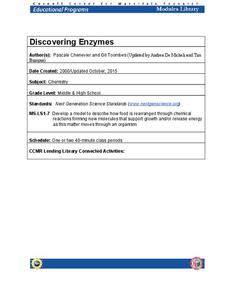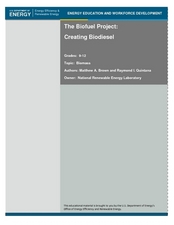Curated OER
Lead and Mercury Ion Catalase Inhibition
Students participate in a laboratory investigation in which they observe the effect of temperature and pH on enzyme activity. Students also examine exposure to heavy metal ions and the effect that may have on enzyme activity.
Cornell University
Bacteria Take Over and Down
Bacteria outnumber all other forms of life on Earth. Scholars observe the growth of bacteria in petri dishes to understand their role in maintaining good health. Then, they observe the growth of bacteria after they introduce...
University of California
Hot! Hot! Hot!
Calories are not tiny creatures that sew your clothes tighter every night, but what are they? A science activity, presented at multiple levels, has learners experiment with heat, heat transfer, and graph the function over time. It also...
Curated OER
Temperature
Several slides compare different temperature scales. Thermal expansion, heat transfer, and Maxwell speed distribution are also explored. The last two slides seem unrelated to the topic of heat, but are easily left out of this otherwise...
Polar Trec
What Is My Footprint?
How do one's habits and lifestyle choices affect the environment? Through a short online survey, learners will calculate their own carbon footprints then determine how to reduce their impact on the environment through simple steps, such...
Olomana School
Mixtures and Solutions: Paper Chromatography Experiment
Why does some ink bleed through paper, and other ink doesn't? Practice some paper chromatography to separate the colors from a pen with an interactive experiment for middle and high schoolers. Learners use a variety of solutions to track...
National Institute of Open Schooling
Mole Concept
Learners explore atomic measurement in the first activity in a series of 36. Through readings, activities, and questions, classes review standard SI units, learn about Avogadro's constant, and use it to help them calculate moles. They...
Cornell University
Discovering Enzymes
Explore the function of enzymes through a series of lab investigations. Learners use household enzymes such as hydrogen peroxide to model the role of enzymes. The enzymes break down proteins with and without a catalyst.
National Institute of Open Schooling
Solutions
Aqua regia, or royal water in Latin, is a solvent that can dissolve solid gold and platinum into a solution. Activity nine in a series of 36 allows classes to learn, through readings and answering questions, what a solution is and the...
Curated OER
Stoichiometry
Balancing equations is a foundational skill for starting chemists. There are a few slides in this PowerPoint with colorful diagrams that help to explain how. Unfortunately, the presentation begins with an unrelated table of contents and...
Curated OER
Matters of Milk and Marshmallows
Pupils observe a teacher demonstration o classifying matter by its physical properties of shape and size. After discussing the definition of matter, students describe the state of matter. They sing a song to the tune of "Bingo." In...
Curated OER
Animal Communication
Students understand that all species have some capacity for communication. Students are exposed to the fact that all species have a capacity for communication. They are enlighten to the fact that communication abilities range from very...
Curated OER
What can I do?
Pupils identify feelings and explore positive ways to handle conflict. In this mental health lesson students discuss feelings and how to constructively handle them.
Curated OER
Activity #17 Co2 From Alka Seltzer
Pupils observe what occurs when Alka Seltzer tablets are added to water. They explain why water stays in the jar when it is above the surface of the water. Pupils test for the presence of carbon dioxide by conduting the match test.
Curated OER
Related to Natural Products
High schoolers examine how the microwave delivers energy at different power levels. They work together to complete experiments on various materials and different power levels. They answer discussion questions to end the lesson.
Curated OER
Understanding of the Structure of an Amino Group
Students review the characteristics of acids and bases. They examine the structure of an amino group and compare amines to ammonia. They work together to develop the concent of polymerization.
Curated OER
What is the Thermal Depolymerization Process?
Students examine the differences between Boyle's Law and Charles' Law. They discuss the concept of thermal depolymerization. They answer discussion questions to end the lesson.
Curated OER
The Bio-fuel Project: Creating Bio-diesel
Students investigate bio-fuel. In this investigative lesson, students create bio-fuel from vegetable oil waste. Students will analyze, predict, collect and synthesize data from their experiments with bio-fuel.
Curated OER
Water Resource Engineering
Learners examine solubility and the significance of water. In this aqueous solution instructional activity students complete a lab activity on soil profiles.
Curated OER
Balancing Equations
In this balancing equations worksheet, students balance ten equations by placing the proper coefficients in front of reactants and products to balance the number of atoms.
Curated OER
Radiochemistry
In this radiochemistry learning exercise, students read about how scientists learn more about elements using radioactive isotopes. Students answer three critical thinking questions about the reading and radiochemistry.
Curated OER
Rechargeable Ni-Cd Batteries
In this rechargeable batteries activity, students read about how nickel-cadmium batteries work and answer four critical thinking questions about rechargeable batteries, how they work and their benefits.
Curated OER
What are Atoms?
In this atom worksheet, high schoolers read about Dalton's contributions to the structure of the atom. They answer five questions about Dalton's ideas, the law of multiple proportions and the law of definite proportions.
Curated OER
Growing Barley for Use in Biosynthesis Experiments
Students attempt to determine the optimum growing conditions for barley. They assess the effects of a number of substances such as ammonium chloride and urea on the plants

























